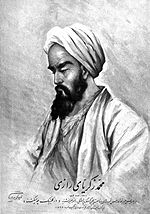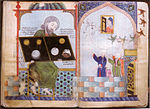Sheikh Bedreddin (redirect from Badr-al Din Simawi)
and the Ottoman state. Many details of Bedreddin's early life are disputed, as much of it is the subject of legend and folklore. He was born in 1359 in the...
14 KB (1,894 words) - 22:18, 16 June 2024
Abu al-Qasim Ahmad ibn Muhammad al-Iraqi al-Simawi (died 1260?) was a Muslim alchemist from Baghdad who performed various experiments and wrote the Kitāb...
975 bytes (108 words) - 00:20, 14 May 2024
the modern reader to discern which aspects of Jabir's work are to be read as symbols (and what those symbols mean), and what is to be taken literally....
2 KB (254 words) - 13:06, 23 October 2024
Islamic Golden Age (category CS1 maint: DOI inactive as of November 2024)
Renaissance within it, while others place the end of the Islamic Golden Age as late as the end of 15th to 16th centuries, including the rise of the Islamic gunpowder...
126 KB (13,893 words) - 20:35, 4 November 2024
compound (sal ammoniac or ammonium chloride) from organic substances (such as plants, blood, and hair) by chemical means. His works also contain one of...
79 KB (9,837 words) - 13:47, 26 October 2024
romanized: Ibn Sīnā; c. 980 – 22 June 1037 CE), commonly known in the West as Avicenna (/ˌævɪˈsɛnə, ˌɑːvɪ-/), was a preeminent philosopher and physician...
115 KB (13,276 words) - 10:53, 3 November 2024
(pharmacist) 12th century al-Ṭughrāʾī Ibn Arfaʿ Raʾs Artephius 13th century al-Simāwī Ibn al-Bayṭār (pharmacist) Abū l-ʿAbbās al-Nabātī (pharmacist) Ḥasan al-Rammāḥ...
9 KB (980 words) - 12:08, 2 January 2024
rarely used Persian word pehrest (fehrest/fehres/fahrasat) meaning "The List" as the title for a handbook on Arabic literature is noteworthy in this context...
12 KB (1,391 words) - 08:30, 22 October 2024
Muḥammad ibn Zakariyyāʾ al-Rāzī), c. 864 or 865–925 or 935 CE, often known as (al-)Razi or by his Latin name Rhazes, also rendered Rhasis, was a Persian...
76 KB (8,940 words) - 04:03, 5 November 2024
civilization. In considering Islamic sciences as a distinct, local practice, it is important to define words such as "Arabic," "Islamic," "alchemy," and "chemistry"...
25 KB (3,040 words) - 07:55, 15 October 2024
twentieth-century occultists and esotericists, among whom the expression "as above, so below" (a modern paraphrase of the second verse of the Tablet) has...
74 KB (7,944 words) - 07:15, 22 October 2024
(Arabic: أبو القاسم مسلمة بن أحمد المجريطي: c. 950–1007), known or Latin as Methilem, was a Muslim Arab astronomer, alchemist, mathematician, economist...
9 KB (955 words) - 01:57, 24 October 2024
خلف بن العباس الزهراوي; c. 936–1013), popularly known as al-Zahrawi (الزهراوي), Latinised as Albucasis or Abulcasis (from Arabic Abū al-Qāsim), was an...
33 KB (4,101 words) - 00:07, 22 October 2024
official of the Buyid era, and philosopher and historian from Parandak, Iran. As a Neoplatonist, his influence on Islamic philosophy is primarily in the area...
10 KB (1,066 words) - 23:07, 23 October 2024
Secretorum or Secreta Secretorum (Latin for "secret of secrets"), also known as the Sirr al-Asrar (Arabic: كتاب سر الأسرار, lit. 'The Secret Book of Secrets')...
9 KB (1,058 words) - 06:56, 22 October 2024
(pharmacist) 12th century al-Ṭughrāʾī Ibn Arfaʿ Raʾs Artephius 13th century al-Simāwī Ibn al-Bayṭār (pharmacist) Abū l-ʿAbbās al-Nabātī (pharmacist) Ḥasan al-Rammāḥ...
3 KB (267 words) - 09:10, 31 October 2024
Muḥammad ibn Umayl al-Tamīmī (Arabic: محمد بن أميل التميمي), known in Latin as Senior Zadith, was an early Muslim alchemist who lived from c. 900 to c. 960...
16 KB (1,850 words) - 06:55, 24 October 2024
Al-Kindi (redirect from Ya'qub Ibn Ishaq As-Sabah, Al-Kindi)
aṣ-Ṣabbāḥ al-Kindī (/ælˈkɪndi/; Arabic: أبو يوسف يعقوب بن إسحاق الصبّاح الكندي; Latin: Alkindus; c. 801–873 AD) was an Arab Muslim polymath active as...
48 KB (6,022 words) - 19:47, 5 November 2024
burning a long time. For this reason the Greeks referred to it as "giving no trouble", as it did not need to be continually attended. It was also called...
3 KB (391 words) - 14:27, 23 October 2024
Diyāʾ al-Dīn Abū Muḥammad ʿAbd Allāh ibn Aḥmad al-Mālaqī, commonly known as Ibn al-Bayṭār (Arabic: ابن البيطار) (1197–1248 AD) was an Andalusian Arab physician...
10 KB (1,095 words) - 06:06, 24 October 2024
Iraq; died c. 930). It contains information on plants and agriculture, as well as on magic and astrology. It was frequently cited by later Arabic writers...
46 KB (5,666 words) - 17:18, 20 October 2024
Abul Ashba ibn Tammam (category CS1 maint: archived copy as title)
chemists. "Archived copy". Archived from the original on 2013-11-10. Retrieved 2013-11-11.{{cite web}}: CS1 maint: archived copy as title (link) v t e...
659 bytes (50 words) - 06:36, 12 September 2022
Lover for the Knowledge of Secret Scripts", perhaps 1022–3 CE), is notable as an early proposal that some Egyptian hieroglyphs could be read phonetically...
17 KB (1,896 words) - 20:32, 23 October 2024
سفيان), c. 668–704 or 709, was an Umayyad prince and purported alchemist. As a son of the Umayyad caliph Yazid I, Khalid was supposed to become caliph...
21 KB (2,417 words) - 09:16, 17 October 2024
(Arabic: العراقي, 'of/from Iraq'), may refer to: Abū l-Qāsim al-ʿIrāqī al-Simāwī, 13th-century Muslim alchemist Zain al-Din al-'Iraqi (1325–1404), Shafi'i...
1 KB (202 words) - 11:20, 25 January 2021
(pharmacist) 12th century al-Ṭughrāʾī Ibn Arfaʿ Raʾs Artephius 13th century al-Simāwī Ibn al-Bayṭār (pharmacist) Abū l-ʿAbbās al-Nabātī (pharmacist) Ḥasan al-Rammāḥ...
2 KB (159 words) - 04:11, 5 November 2024
Al-Muizz ascended the throne as a minor following the death of his father Badis ibn Mansur, with his aunt, Umm Mallal, acting as regent. According to Ibn...
9 KB (963 words) - 10:08, 30 October 2024
(pharmacist) 12th century al-Ṭughrāʾī Ibn Arfaʿ Raʾs Artephius 13th century al-Simāwī Ibn al-Bayṭār (pharmacist) Abū l-ʿAbbās al-Nabātī (pharmacist) Ḥasan al-Rammāḥ...
2 KB (161 words) - 16:03, 30 October 2024
Sharaf al-Din Ali Yazdi, Shams al-Din al-Fanari and Šayḫ Badr al-Dīn al-Simāwī. He moreover influenced Jalal al-Din Davani and Mir Damad. Coulon, Jean-Charles...
4 KB (357 words) - 07:58, 24 July 2024
Ahmad bin Muhammad bin Mufarraj bin Ani al-Khalil (fl. c. 1200), better known as Abu al-Abbas al-Nabati, Ibn al-Rumiya or al-Ashshab, (Arabic: أبو العباس النباتي...
6 KB (668 words) - 19:03, 27 October 2024












